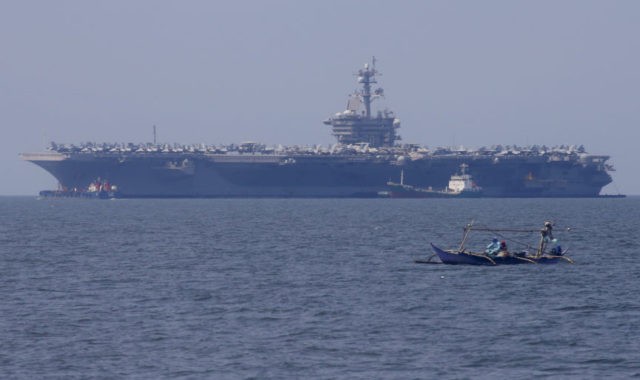The aircraft carrier USS Carl Vinson docked in Danang on Monday, marking the first visit by an American aircraft carrier to Vietnam since the end of the Vietnam War.
The port call is seen as both a landmark in evolving U.S.-Vietnam relations and a strong message to China, which is taking aggressive action to seize control over the entire South China Sea.
“Our nations’ relationship has reached new heights in the past few years, and the USS Carl Vinson‘s port visit to Vietnam is a reflection of that,” said U.S. Pacific Fleet Commander Adm. Scott Swift.
U.S. military and administration officials presented the visit as a “routine” affair that would help build “people to people connections,” as Lt. Commander Tim Hawkins told journalists visiting USS Carl Vinson. He stressed engagements with Vietnamese experts in engineering, medicine, humanitarian assistance, and disaster relief, and looked forward to “cultural exchanges” involving food and the local lifestyle.
“Sailors from the American carrier are scheduled to spend time at a treatment center for people who were exposed to Agent Orange, the toxic defoliant sprayed over large swathes of land by the U.S. military during the war, and at an orphanage. They will also play basketball and soccer games with locals, while the navy band will give concert performances,” Voice of America News reported.
“Through hard work, mutual respect, and by continuing to address the past while we work toward a better future, we have gone from former enemies to close partners,” said U.S. Ambassador to Vietnam Dan Kritenbrink.
However, analysts almost universally interpreted the visit as “a clear shot at Beijing, designed to counter China’s aggressive island building and militarization in the South China Sea,” as CNN wrote.
“Vietnam has been deeply concerned about China’s pugilistic and aggressive moves in the South China Sea. They are worried about where China is going, and they have wanted for years now to have a better relationship with the United States,” CNN analyst and retired U.S. Navy rear admiral John Kirby explained.
Vietnam is perhaps the only stakeholder still taking a strong stance against Chinese aggression in the South China Sea, now that Philippine President Rodrigo Duterte has largely folded his cards. Vietnam is directly challenging Chinese territorial claims that involve oil resources and urging the rest of the Association of Southeast Asian Nations (ASEAN) to follow suit.
Voice of America observes that the message Washington and Hanoi are sending Beijing by way of the USS Carl Vinson is subtle and carefully calibrated, as Vietnamese envoys have been “working to ease Chinese concerns over the visit and the prospect of broader security cooperation between Hanoi and Washington.”
Carrier Strike Group 1 Commander Adm. John Fuller stressed that the U.S. was “not going to pick sides” in ongoing disputes between Vietnam and China.
“The United States is here to maintain rules, laws and norms, and we’ll do that in South China Sea. We’ll do that wherever international laws allow us to operate,” Fuller said.
On previous occasions, the U.S. Navy has made it clear it will not be deterred from sailing through international waters by the presence of militarized Chinese islands and will continue to patrol the region as it has done for the past 70 years.
Stars & Stripes quotes Vietnamese citizens who sounded very excited by the aircraft carrier’s visit:
“During the war, I was scared when I saw American soldiers,” said Tran Thi Luyen, 55, who runs a small coffee shop in the city. “Now the aircraft carrier comes with a complete [sic] different mission, a mission of peace and promoting economic and military cooperation between the two countries.”
Huynh Quang Nguyen, a taxi driver, echoed the sentiment.
“I’m very happy and excited with the carrier’s visit,” he said. “Increased cooperation between the two countries in economic, diplomatic and military areas would serve as a counterbalance to Beijing’s expansionism.”
China’s Foreign Ministry responded to the USS Carl Vinson’s visit on Friday by expressing hopes that exchanges between the U.S. and Vietnam would “contribute to regional peace and stability in a positive and constructive way, instead of adding any unsettling factors.”

COMMENTS
Please let us know if you're having issues with commenting.